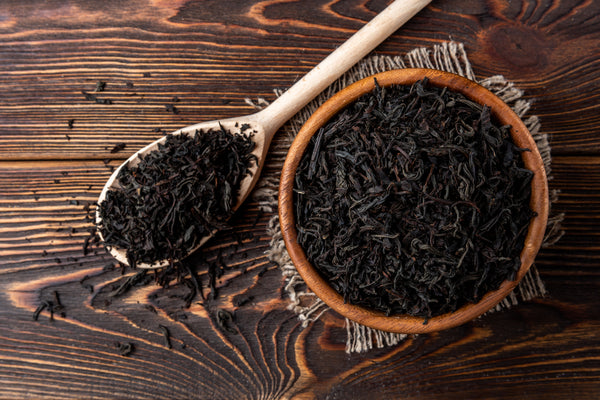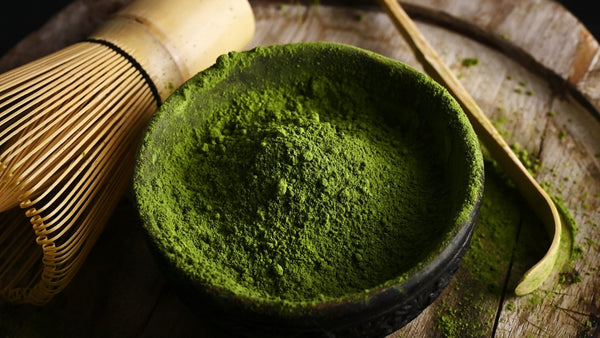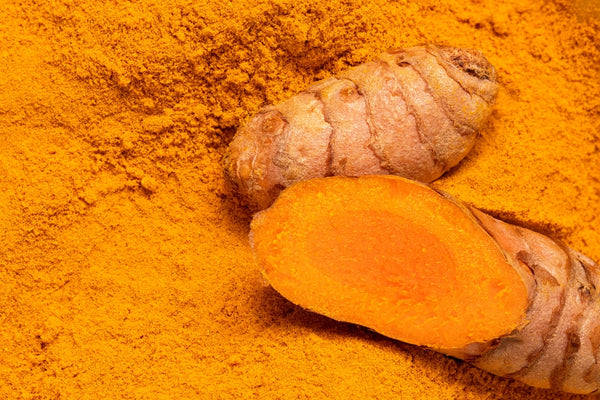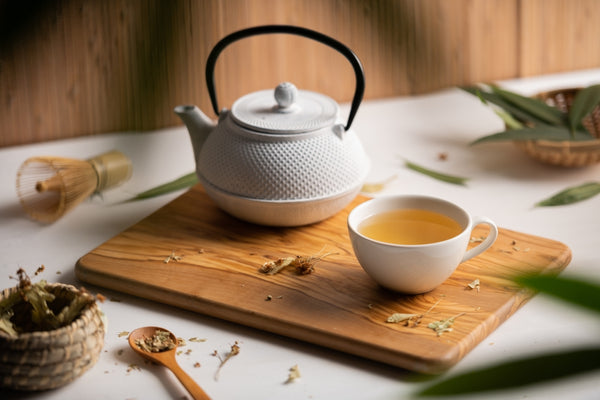Tea has been used in different cultures for centuries and has long been celebrated for its many health properties. Study after study shows that tea can improve immune function, provide mental clarity, decrease inflammation, reduce cancer risk, and even improve cardiovascular health.

When it comes to our health, however, not all teas are equal, and different varieties of tea offer different benefits. For example, matcha may be especially helpful for mental clarity, whereas chamomile can help you get a good night’s rest. While there’s a huge variety of options when it comes to tea, the research is clear that drinking tea is good for our health. And this holds true for heart health as well. However, it does appear that there are some teas that are better than others when it comes to protecting your heart. And as always, it's important to check with your medical team before making any changes to your diet. There are known interactions with tea and certain blood pressure/heart drugs.
Wondering which teas can help with heart health and which teas you may want to avoid? Keep reading to find out!
1. Black Tea

Black tea comes from the plant Camellia sinensis (as do white and green tea), and while there are many varieties, it tends to have a bold, earthy caramel flavor. Black tea is rich in antioxidants, including polyphenols and flavonoids, and can positively contribute to overall vitality and health.
When it comes to heart health, some animal studies show that black tea can reduce cholesterol levels. A large study review found that daily black tea consumption led to a 4% lower risk of death from heart disease and a 2% lower risk of heart attack or other cardiovascular event. This was also shown in another study-- people who drank black tea regularly had an 8% lower risk of heart disease and a 10% lower risk of having a heart attack. So far, it appears that black tea is beneficial to your heart.
2. Green Tea

Green tea, and especially matcha, is often publicized as one of the healthiest beverages on the planet, and for good reason. It has a high number of antioxidants and has also been shown to boost cognitive function. There are many varieties of green tea, including matcha. Matcha utilizes the whole tea leaf and is ground into a very fine powder. Because of the way it’s grown and processed, matcha has an especially high number of antioxidants (10x that of regular green tea) and also contains the beneficial amino acid l-theanine.
Among other benefits, several review studies suggest that green tea may help lower risk factors for heart disease, such as high blood pressure and high lipid levels. Green tea may also help with weight loss and healthy weight management, which can be beneficial for preventing heart disease.
Wondering if green tea or matcha is better for your heart? Read more here.
3. Turmeric Tea
Turmeric has a long history in Indian and Ayurvedic medicine. The root can be used fresh, dried, or turned into a powder, used as a spice, or made into tea. Turmeric contains a group of antioxidants known as curcuminoids, which researchers have found to be helpful for reducing inflammation and containing antidiabetic and antioxidant properties. Studies suggest that turmeric may support heart health by lowering blood pressure levels as well as reducing LDL (bad) cholesterol and total triglycerides.

Check out our Japanese fermented turmeric tea powder.
4. Oolong Tea
Oolong tea is a traditional Chinese tea made from the same plant as green and black tea, Camellia sinensis. The leaves can be processed to produce green or dark oolong varieties. Oolong tea has a nutrition profile similar to that of black and green tea and is thought to benefit overall health by protecting against insulin resistance and lowering heart disease risk, among other benefits. One study found that Japanese men who drank 8 ounces of oolong tea per day had a 61% lower heart disease risk.
5. Chamomile Tea
Chamomile is an herbal tea often used to reduce stress and help with sleep. It’s made by steeping dried daisy-like flowers in water. Chamomile is caffeine-free and, like other types of tea, has a plethora of antioxidants, which can improve health and lower the risk for certain types of cancer and heart disease.
Chamomile is rich in flavones, a type of antioxidant that may lower blood pressure and cholesterol levels. One notable study found that people who drank chamomile tea with meals had improvements in their total triglycerides and LDL (bad) cholesterol levels. However, caution should be taken as herbal teas can interact with some medications, including heart medicine.
6. Rooibos Tea

Rooibos is an herbal tea that has been consumed in South Africa for centuries. It’s made from fermented tea leaves and is naturally caffeine-free. One study found that people who drank rooibos tea daily for six weeks had significantly lower LDL cholesterol and higher HDL levels. Rooibos may also work as an ACE inhibitor, which can reduce blood pressure levels. However, studies have been small, and more research is still needed.
7. Ginger Tea
Ginger is often used as a cooking spice and has been used for centuries to relieve nausea, arthritis, colds, and diabetes. It can be used in a multitude of ways, including fresh, candied, pickled, powdered, and candied. One of our favorite ways to consume it is as a tea. The main bioactive components of ginger are gingerols and shogaols, which give ginger its numerous benefits.

Among many other benefits, it does appear ginger may benefit heart health by lowering blood pressure, preventing heart attacks and blood clots, relieving heartburn, lowering cholesterol, and improving blood circulation.
8. Hibiscus Tea
Hibiscus tea is an herbal tea made by steeping the flowers of the hibiscus plant. It produces a bright red tea that’s slightly sweet and sour with floral notes. It’s rich in antioxidants and may benefit heart health by helping to lower blood pressure. However, it is not recommended for people already taking blood pressure medication as it can interfere with these drugs. Some studies have also found that hibiscus may improve blood fat levels, which can be a risk factor for heart disease. When it comes to hibiscus for heart health, studies are limited, and more research is needed.
9. White Tea

White tea comes from the same plant as green and black tea and is considered the least processed of these three teas. Young leaves are picked and allowed to air dry but not oxidize, giving the tea its pale color and unique taste. White tea also contains antioxidants and may have cancer-protecting properties. However, research is lacking on whether or not it benefits heart health.
10. Peppermint Tea
Peppermint tea is often used as a digestion aid and can help soothe an upset stomach. It does not contain caffeine, so it is a good option for those sensitive to caffeine or as an option in the evenings. Peppermint tea is delicious and can soothe your tummy, but whether or not it can benefit heart health is still yet to be decided, and there’s not much research suggesting it supports heart health in any way.
Bottom Line:
Drinking tea is a great way to add antioxidants to your diet and may help reduce the risk of certain diseases and conditions. When it comes to improving heart health, there are a variety of teas that may be beneficial. However, it’s always important to check with your healthcare team as some tea may also interact with medications.
Disclaimer: These statements in this blog post have not been evaluated by the Food and Drug Administration. The information provided here is for educational purposes only and should not be considered medical advice. It's essential to consult with a qualified healthcare professional before making any dietary or lifestyle changes.
Resources:
Chung M, Zhao N, Wang D, Shams-White M, Karlsen M, Cassidy A, Ferruzzi M, Jacques PF, Johnson EJ, Wallace TC. Dose-Response Relation between Tea Consumption and Risk of Cardiovascular Disease and All-Cause Mortality: A Systematic Review and Meta-Analysis of Population-Based Studies. Adv Nutr. 2020 Jul 1;11(4):790-814. doi: 10.1093/advances/nmaa010. PMID: 32073596; PMCID: PMC7360449.
Li X, Yu C, Guo Y, Bian Z, Si J, Yang L, Chen Y, Ren X, Jiang G, Chen J, Chen Z, Lv J, Li L; China Kadoorie Biobank Collaborative Group. Tea consumption and risk of ischaemic heart disease. Heart. 2017 May;103(10):783-789. doi: 10.1136/heartjnl-2016-310462. Epub 2017 Jan 11. PMID: 28077466; PMCID: PMC5529974.
Mineharu Y, Koizumi A, Wada Y, et al Coffee, green tea, black tea and oolong tea consumption and risk of mortality from cardiovascular disease in Japanese men and women, Journal of Epidemiology & Community Health 2011;65:230-240.
Montalvo-González E, Villagrán Z, González-Torres S, Iñiguez-Muñoz LE, Isiordia-Espinoza MA, Ruvalcaba-Gómez JM, Arteaga-Garibay RI, Acosta JL, González-Silva N, Anaya-Esparza LM. Physiological Effects and Human Health Benefits of Hibiscus sabdariffa: A Review of Clinical Trials. Pharmaceuticals (Basel). 2022 Apr 12;15(4):464. doi: 10.3390/ph15040464. PMID: 35455462; PMCID: PMC9033014.
Nevin Sanlier, Buşra Basar Gokcen, Mehmet Altuğ, Tea consumption and disease correlations, Trends in Food Science & Technology, Volume 78, 2018, Pages 95-106, ISSN 0924-2244, https://doi.org/10.1016/j.tifs.2018.05.026.
Soppert J, Lehrke M, Marx N, Jankowski J, Noels H. Lipoproteins and lipids in cardiovascular disease: from mechanistic insights to therapeutic targeting. Adv Drug Deliv Rev. 2020;159:4-33. doi: 10.1016/j.addr.2020.07.019. Epub 2020 Jul 27. PMID: 32730849.
Persson IA, Persson K, Hägg S, Andersson RG. Effects of green tea, black tea and Rooibos tea on angiotensin-converting enzyme and nitric oxide in healthy volunteers. Public Health Nutr. 2010 May;13(5):730-7. doi: 10.1017/S1368980010000170. Epub 2010 Feb 10. PMID: 20144258.
Peterson JJ, Dwyer JT, Jacques PF, McCullough ML. Associations between flavonoids and cardiovascular disease incidence or mortality in European and US populations. Nutr Rev. 2012 Sep;70(9):491-508. doi: 10.1111/j.1753-4887.2012.00508.x. Epub 2012 Aug 17. PMID: 22946850; PMCID: PMC4130174.
Rafraf M, Zemestani M, Asghari-Jafarabadi M. Effectiveness of chamomile tea on glycemic control and serum lipid profile in patients with type 2 diabetes. J Endocrinol Invest. 2015 Feb;38(2):163-70. doi: 10.1007/s40618-014-0170-x. Epub 2014 Sep 7. PMID: 25194428.
Tirang R. Neyestani, Bahareh Nikooyeh, A comprehensive overview on the effects of green tea on anthropometric measures, blood pressure, glycemic and lipidemic status: An umbrella review and meta meta-analysis study, Nutrition, Metabolism and Cardiovascular Diseases, Volume 32, Issue 9, 2022, Pages 2026-2040, ISSN 0939-4753, https://doi.org/10.1016/j.numecd.2022.05.021.
Qin S, Huang L, Gong J, Shen S, Huang J, Ren H, Hu H. Efficacy and safety of turmeric and curcumin in lowering blood lipid levels in patients with cardiovascular risk factors: a meta-analysis of randomized controlled trials. Nutr J. 2017 Oct 11;16(1):68. doi: 10.1186/s12937-017-0293-y. PMID: 29020971; PMCID: PMC5637251.
Wang Y, Yu H, Zhang X, Feng Q, Guo X, Li S, Li R, Chu D, Ma Y. Evaluation of daily ginger consumption for the prevention of chronic diseases in adults: A cross-sectional study. Nutrition. 2017 Apr;36:79-84. doi: 10.1016/j.nut.2016.05.009. Epub 2016 Jun 3. PMID: 28336112.
Zhao Y, Asimi S, Wu K, Zheng J, Li D. Black tea consumption and serum cholesterol concentration: Systematic review and meta-analysis of randomized controlled trials. Clin Nutr. 2015 Aug;34(4):612-9. doi: 10.1016/j.clnu.2014.06.003. Epub 2014 Jun 13. PMID: 24972454.







